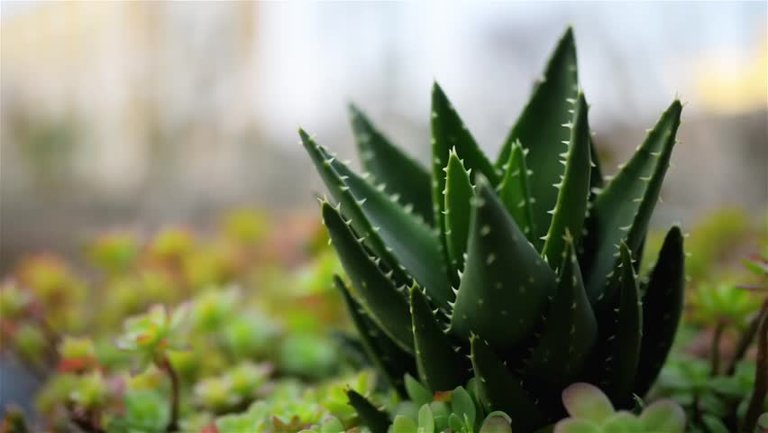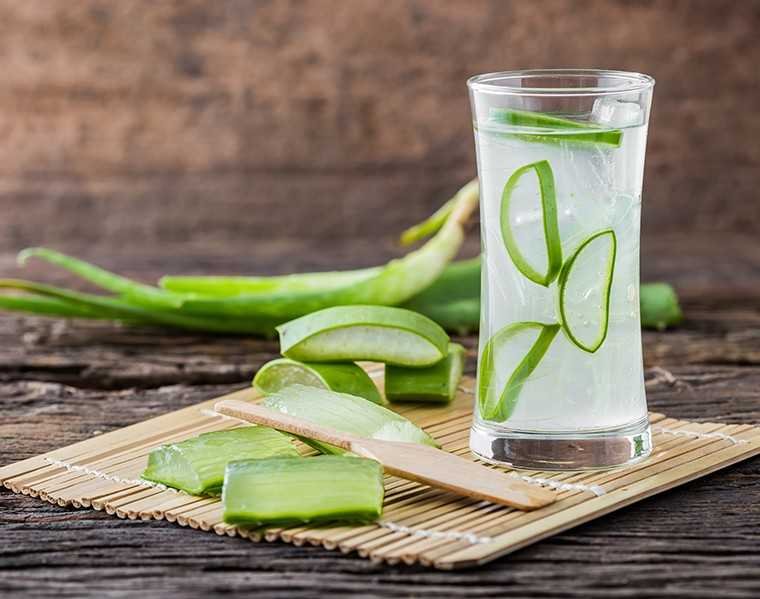
The Aloe vera plant is being used since centuries for health and beauty. In ancient Egypt, this plant was called the ‘plant of immortality’.It is often described as a wonder plant due to its several health benefits. Read on to know about the impressive health benefits of aloe vera!
Aloe vera is a short-stemmed shrub and the gel obtained from the plant’s leave is the main ingredient used in beverages, skin lotion and cosmetics. It is grown mainly in the dry regions of Africa, Asia, Europe and America. In India, aloe vera is mainly found in Rajasthan, Andhra Pradesh, Gujarat, Maharashtra and Tamil Nadu.
It is called ‘Ghritkumari’ in Hindi, ‘kalabanda’ in Telegu, ‘lolisara’ in Kannada, and ‘ghrtakumar’ in Bengali. The word aloe vera is derived from the Arabic word “Alloeh” meaning “shining bitter substance”. On the other hand, “vera” is a Latin word meaning “true.”
Did you know?
– Wild species of aloe vera have been known to survive 100 years
– There are around 250 species of aloe vera but only 4 of them are cultivated for their health benefits
– The Egyptian queen Cleopatra was said to apply aloe vera gel as a part of her beauty ritual.
Aloe produces gel and latex, which are used for making medicines. Aloe gel (clear, jelly-like substance) is present in the inner parts of the aloe leaf whereas the aloe latex is yellow in colour and is present just under the plant’s skin. It is eaten orally mainly as a laxative to get relief from constipation.
The translucent gel is made up of 99% water, and rest is made of glucomannans, amino acids, lipids, sterols and vitamins. Aloe vera contains vitamin A, vitamin B12, vitamin C, and vitamin E. It also contains calcium, magnesium, zinc, chromium, selenium, iron, potassium, copper and manganese. It provides 7 of the 8 essential amino acids.
Various traditional branches of medicines like Ayurveda, Chinese and modern British herbal medicine have advocated aloe vera for its healing properties. It is said that Alexander the Great conquered the island of Socotra, off the coast of Africa to secure supplies of aloe vera to treat wounded troops.
The 10 Health Benefits Of Aloe Vera -
Reduces Cholesterol
A few studies have indicated that aloe vera can play a role in lowering cholesterol. According to the National Institutes of Health (NIH), daily intake of 10 ml or 20 ml of aloe for 3 months was shown to reduce LDL (bad) cholesterol by 18 % and total cholesterol by 15 %.
Aids Wound Healing
Aloe vera contains the hormones auxins and gibberellins that help in wound healing and have anti-inflammatory properties. Glucomannan (a polysaccharide) and gibberellins increase collagen synthesis by stimulating fibroblast activity and proliferation. The fibroblast is a type of cell that produces collagen and other fibers essential for tissue repair.
Maintains Heart Health
Aloe Vera leaf gel reduces serum cholesterol and triglyceride levels and increases HDL levels. Researchers have found that Aloe Vera leaf gel easily stimulates the fibroblasts for making new tissues. When fibroblasts are stimulated, proteoglycans and collagens are formed which help reduce the risk of cardiovascular disorders.
Improves Digestion
Aloe vera is a prebiotic super food because it feeds the beneficial bacteria in the gut which helps in maintaining a healthy microbiome. It also helps in controlling stomach ulcers. Aloe vera juice may also help treat irritable bowel syndrome (IBS) and other inflammatory disorders of the intestine.
Strengthens Immunity
Aloe vera effectively works as a cellular regenerator and offers antibacterial and antifungal benefits. It is also a strong antioxidant as the juice activates the cells to produce nitric oxide and cytokines. As a result, this helps the immune system to fight free radicals that can cause cancer and other diseases.
Reduces Inflammation
The high content of fatty acids in the herb has the ability to decrease healing time for second- and third-degree burns. Due to its antimicrobial properties, it helps to reduce bacterial colonization preventing skin infection.
Aids Detox
The good thing about including gelatinous plant food such as aloe vera in your diet is that the gels from these plants move through the intestinal tract and absorb toxins along the way, eliminating it through the colon. This helps in proper elimination of waste from your body thus detoxifying it.
Studies conducted at the University Of Las Palmas De Gran Canaria, Spain in May 2013 determined that the methanol extract of the leaves and flowers of aloe vera may have beneficial effects on the human health. The reports suggested that both aloe vera flower and leaf extracts have antioxidant properties, especially the leaf skin extract. The leaf skin extract also exhibited anti-mycoplasmic properties. Anti-mycoplasmic substances have the ability to destroy bacterias.
Enhances Skin Health
Aloe vera soap and gel contains several nutrients such as glycerin, sodium palmate, sodium carbonate, sodium palm, sorbitol which nourish the skin. It is also rich in various vitamins and beta-carotene which slows down visible signs of aging such as wrinkles, dark spots and dullness.
Treats Hemorrhoids
Aloe vera is an effective treatment of piles. The anti-inflammatory properties of aloe vera reduce inflammation and alleviate bowel irregularities and intestinal problems. It also makes the stool soft and easy to pass. Additionally, anthraquinones, one of the key compounds present in aloe vera helps stimulate contractions on the walls of the digestive tract.
Improves Hair Health
Aloe vera contains enzymes called proteolytic enzymes which repairs the dead skin cells on the scalp. It also reduces dandruff, hair fall and acts as a great hair conditioner. The primary protein of hair is keratin which consists of amino acids, oxygen, carbon as well as small amounts of hydrogen, nitrogen, and sulphur. The chemical makeup of aloe vera is similar to that of keratin and it rejuvenates the hair with its own nutrients, giving it more elasticity and preventing breakage.
Ways To Use Aloe Vera
Here are a few ways in which you can use aloe vera in your daily life:
- For dry skin, take some aloe vera and add a pinch of turmeric and teaspoon of honey and milk along with few drops of rose water. Apply it and leave for 20 minutes.
- It can be used for the treatment of acne due to its antioxidant property. Mix aloe vera gel, blended walnuts and honey and apply it on the skin for smooth and clear skin.

- You can drink aloe vera juice to make your body healthy and fit as it will make your body alkaline. A body with acidic pH is a breeding ground for various disease and ailments.
- To keep your liver healthy, it is good to drink aloe vera juice as it is rich in phytonutrients and keeps the body hydrated.
- For quick healing of burns, apply aloe vera gel. It is said that in 1944 Japanese bombing, soldiers used aloe vera gels to help heal the burns faster.
What Are The Possible Side Effects?
Some possible side effects of aloe vera are:
- Latex in the aloe vera leaves may trigger an allergic reaction to those who are sensitive to latex causing stomach issues like irritation, stomach cramps and low potassium. The gel of aloe vera may also cause skin allergies and redness on the skin.
- Since aloe vera contains latex, consuming aloe vera juice might cause your blood sugar levels to drop and has the chances of electrolyte imbalance in diabetics.
- The laxative effects of aloe vera can lead to dehydration. Laxatives are generally used to alleviate constipation and if taken more than the recommended dosage, it may cause dehydration.
- Pregnant women and lactating mothers should avoid drinking aloe vera juice as it may stimulate uterine contractions in pregnant women, which may lead to birth complications.
- Aloe vera juice may lower the levels of potassium in the body causing irregular heartbeat, weakness and fatigue. Elderly and sick people are generally advised to not consume it due to such symptoms it can induce.
- The latex can cause excessive cramps and stomach pain which is one of the most common side effects of drinking aloe vera juice. It is advised not to consume aloe vera juice if you are dealing with stomach problems.
Dosage
Though there has not been extensive research regarding dosage of aloe vera, 300 mg is considered as a safe dosage. Individuals who want to use aloe vera should follow recommended dosing on package labelling. Using aloe vera gel for a prolonged period of time can lead to allergic reactions including hives or an eczema-like rash.
Source
Plagiarism is the copying & pasting of others work without giving credit to the original author or artist. Plagiarized posts are considered spam.
Spam is discouraged by the community, and may result in action from the cheetah bot.
More information and tips on sharing content.
If you believe this comment is in error, please contact us in #disputes on Discord
This is from our own website
Hi! I am a robot. I just upvoted you! I found similar content that readers might be interested in:
https://www.yellowsquash.in/2019/01/24/10-impressive-health-benefits-of-aloe-vera/
Haha yeah very similar!
Love it! Such great information. It would be good if you added a link to where you can find good quality stuff (also you can make a commission if you add an affiliate link) :)
You can buy aloe vera juice bottles from any supermarket...or best if you can grow the plant yourself and use the fresh gel @lilamay